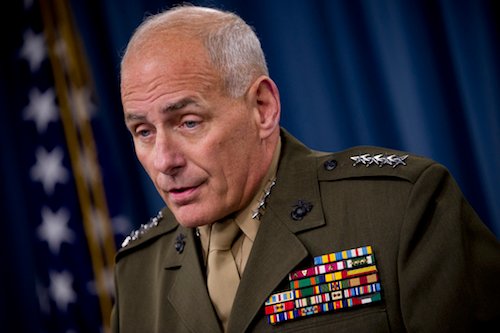On Wednesday, Donald Trump named his nominee for the next leader of Homeland Security, retired Marine Gen. John F. Kelly.
The announcement comes the same day the president-elect was named Time Magazine’s “Person of the Year” and promised an American defeat of ISIS.
Kelly becomes the third famous general of modern warfare in Trump’s Washington Cabinet, along with “Mad Dog” Mattis (Defense Secretary) and Gen. Michael T. Flynn (National Security Advisor). In an effort to “drain the swamp,” it appears as if Trump is bringing out the heavy artillery.
Here are five things to know about the general, who must be confirmed by the Senate and obtain a special waiver from Congress:
He would be the first DHS secretary with a military background

Wikimedia Commons
The relatively new department has been around for 15 years and commands an annual budget of more than $98 billion, and was established by President George W. Bush in order to combat domestic threats and prevent border penetration by terrorists.
Since then, there have been five leaders of the department, all of whom have been lawyers. Trump’s pick of Kelly makes history as the first military man to take the reins of the civilian agency, and marks a turning point in U.S. policy on border patrol.
He advocated for keeping Guantanamo Bay open
Closing the Guantanamo Bay prison complex was a promise President Obama had made to friends and supporters on the left as he sought the presidency. It was a famously broken promise, and perhaps with Kelly at the helm of U.S. Southern Command, the task became nearly impossible.
“[The detainees] were doing something negative, something bad, something violent, and they were taken from the battlefield . . . I have dossiers on all of them, built and maintained by the intelligence community, both military and civilian,” he said of the prison’s importance. “There are no innocent men down there.”
He lost a son in the Afghanistan War effort
Kelly’s son Robert, a lieutenant in the Marines, was killed in combat during a mission in Afghanistan.
Of families who give their children up to military endeavors for national service, he has said, “their struggle is your struggle. If anyone thinks you can somehow thank them for their service, and not support the cause for which they fight – our country – these people are lying to themselves . . . More important, they are slighting our warriors and mocking their commitment to this nation.”
In his own combat role, the elder Kelly was in charge of leading troops in a push to take the Iraqi city of Tikrit after the fall of Baghdad in 2003.
He perceives a threat in the Western Hemisphere
The Military Times reported earlier this month that Kelly has better relationships in Latin American than the State Department. In his time leading the U.S. Southern Command, he worked with Homeland Security divisions on counterdrug tasks and gained insights into vast networks of what he dubbed “transnational organized crime.”
He warned the Senate Armed Services Committee at the time that it would be dangerous to underestimate the level of security in this part of the world given the networks of crime coming out of places like Venezuela, Columbia Bolivia and Mexico.
He will be working with Trump to enforce border security
If confirmed, Kelly is tasked with a tall order. Homeland Security has multiple agencies in charge of patrolling the borders, from the U.S. Coast Guard to the U.S. Customs and Border protection. The agencies also work with the Mexican government on collaborative efforts meant to curb drug trafficking and enhance trade.
“Despite the heroic efforts of our law enforcement colleagues, criminal organizations are constantly adapting their methods for trafficking across our borders,” Kelly has said.
With the former brigadier general leading Trump’s effort to secure the borders, some critics are concerned of increased militarization along the border. There will be more than 240,000 under his employ.
